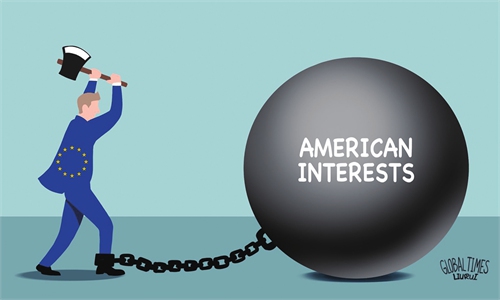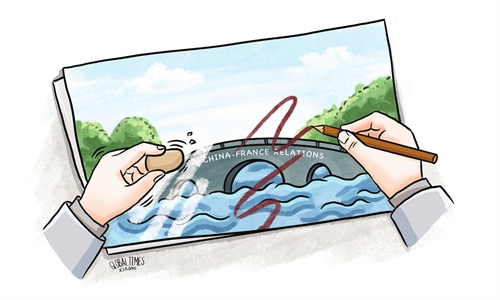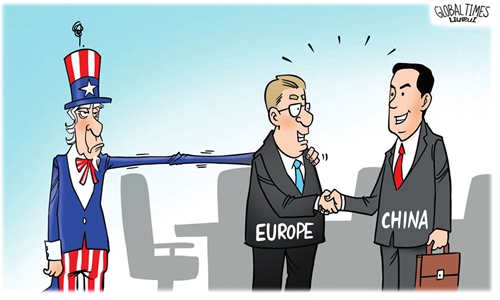China-Europe economic ties show positive signs, to serve as cornerstone for bilateral relations despite challenges
‘Cooperation trend won’t change’ despite challenges

Chinese Commerce Minister Wang Wentao on Monday meet with Valdis Dombrovskis, the European Commission's executive vice president and commissioner for trade, in Brussels. Photo: Ministry of Commerce
While China-Europe relations are at a crossroads amid "decoupling" calls and instigations by the US, there are multiple signs that bilateral economic ties are embarking on fast-track development, with dialogues restarting in various sectors and two-way high-level visits resuming in recent days.
The trend underscored the importance of bilateral economic relations, which are expected to act as the cornerstone that continues to drive the sound development of relations, observers said. The main tone of cooperation between China and Europe won't change, despite certain difficulties due to coercion from geopolitical crises, they noted.
The remarks came after Chinese Commerce Minister Wang Wentao on Monday met with Valdis Dombrovskis, the European Commission's executive vice president and commissioner for trade, in Brussels, where they exchanged views on topics including promoting bilateral trade and investment, maintaining the stability of industry and supply chains, and expanding cooperation in green and low-carbon investment, according to the website of China's Ministry of Commerce on Tuesday.
Wang's visit to Europe came as China-EU relations have been in the limelight in recent days, on the heels of European leaders and officials including French President Emmanuel Macron, European Commission chief Ursula von der Leyen and German Foreign Minister Annalena Baerbock visiting China earlier this month.
It also came amid an ongoing debate on the EU's China policy, with some anti-China forces attempting to create discord in bilateral relations.
The recent frequent China-EU high-level exchanges and rolling out of dialogue and cooperation in various fields demonstrated positive development momentum for bilateral ties, Bai Ming, deputy director of the international market research institute at the Chinese Academy of International Trade and Economic Cooperation, told the Global Times on Tuesday.
The face-to-face exchanges are set not only to inject more momentum into bilateral relations, but also to provide an opportunity for the two sides to expound their positions, explore more common ground for cooperation and avoid potential misunderstandings that could swerve into barriers hindering the deepening of bilateral relations.
"Europe has realized the importance of the Chinese market in economic terms, especially amid growing uncertainties for the EU economy," Bai said.
But on the other hand, the European side has changed its previous practice of separating the economy from politics. It began to view its relations with China from the perspective of "political and economic integration" by increasingly politicizing issues in the economic sector, Zhang Monan, deputy director of Institute of American and European studies at the China Centre for International Economic Exchanges in Beijing, told the Global Times on Tuesday.
For instance, Germany has started to show signs of tightening its scrutiny of Chinese investment from telecoms gear to major infrastructure projects.
Germany is reviewing its decision to allow China's COSCO to take a stake in one of logistics company HHLA's three terminals at Germany's largest port Hamburg, Reuters reported on April 13.
Despite that, bilateral cooperation is still the mainstream, and experts called for seeking more cooperation with Europe in areas where both sides could tap into huge potential and benefits.
"Regardless of rising competition and confrontation from Europe, complementarity is still the major tone of China-EU economic and trade relations. The space for cooperation between the two sides is far greater than competition," Zhang stressed.
She offered the instance of industrial goods where China and Europe are highly intertwined.
With the development of China's manufacturing industry and its rapid rise to the upstream of the global industry chain, the export share of highly complex products has continued to increase, and China has become Europe's largest source of industrial imports.
"Equal and win-win relations between China and EU, the largest developing country and the largest alliance of developed countries, will offer a new pattern for global cooperation, which carries significant meaning not only for themselves but also for the world," Zhang noted.
As explained by Von der Leyen during the European Parliament plenary session on April 18, Europe should not follow some country's bid to seek "decoupling" from China.
"We do not want to cut economic, societal, political and scientific ties. We have many strong links and China is a vital trading partner - our trade represents some 2.3 billion euros [$2.5 billion] a day. Most of our trade in goods and services remains mutually beneficial," Von der Leyen said.
Analysts also called for the European side to play a more positive role in reactivating the China-EU Comprehensive Agreement on Investment, which was stalled by the European Parliament in May 2021. The deal will have a positive impact on promoting the growth of China-EU two-way investment, strengthening bilateral economic and trade cooperation, and boosting the world economy, Lu Ting, a researcher at the Institute of World Economics and Politics of the Chinese Academy of Social Sciences, told the Global Times on Tuesday.



